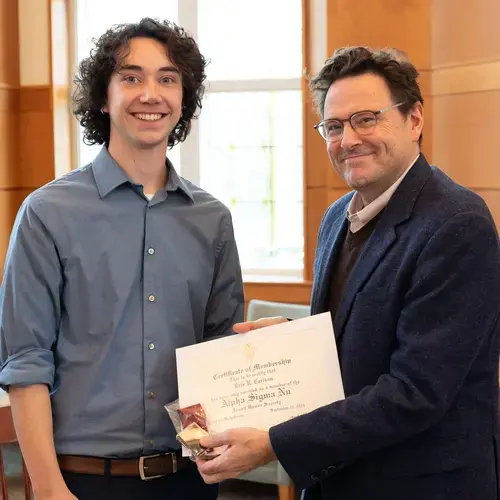
Top Producing Fulbright Institution
Holy Cross is among the top institutions for Fulbright fellows. Over the last 14 years (2011–2025), 107 Holy Cross graduates have been awarded Fulbright Scholarships.


Each year, outstanding students are invited into national honor societies celebrating academic prowess and dedication to the liberal arts. As students delve into their fields, they find dozens of opportunities to earn awards that reflect their academic accomplishments, standout writing and dynamic contributions to their disciplines.
The College Scholars Program brings together academically accomplished and highly motivated students to pursue advanced, multidisciplinary studies in the natural sciences, social sciences and humanities. The program is grounded in deep appreciation of creativity, curiosity and intellectual openness, and is especially well suited for students who hope to build upon the expertise they develop in their majors. Students accepted into this very selective program take a special seminar, participate in an interdisciplinary colloquium and pursue a senior thesis project.
The Fenwick Scholar Program is the highest academic honor the College bestows. Each year, a cohort of senior scholars are given the unique opportunity to pursue challenging, yearlong projects that they have designed in consultation with one or more faculty advisors. The Fenwick Scholars are selected through a rigorous application process which takes place during the student's junior year.
The honor society of the Jesuit institutions of higher education, Alpha Sigma Nu is unique among honor societies in that it seeks to identify the most promising students who demonstrate an intelligent appreciation of and commitment to the ideals of Jesuit high education-intellectual, social, moral, and religious. Students who rank in the top 15 percent of their class may be considered for membership. Each chapter can nominate no more than four percent of a particular class. Selection is based on scholarship, loyalty, and service.
Founded in 1776, Phi Beta Kappa is the oldest and most prestigious national honor society of the liberal arts and sciences. Election to Phi Beta Kappa is recognition of academic achievement and is intended for students who have demonstrated particular breadth in their undergraduate program. Each year, the Holy Cross Chapter of Phi Beta Kappa nominates for membership fourth-year students from the top ten percent of their class who have completed one course in mathematics and have demonstrated language competence equivalent to the second semester of an intermediate-level language course (in addition to their common requirements). In addition, the Chapter nominates third-year students who have completed at least 20 semester courses and demonstrated an exceptional level of academic achievement.
The Office of Distinguished Fellowships and Graduate Studies helps guide students — from current first-years to Holy Cross alumni — in identifying and pursuing these opportunities that best suit their academic and vocational goals. Opportunities include Fulbright, Goldwater, Marshall, Gates Cambridge and Rhodes fellowships. Winners of these awards typically receive funding to pursue advanced research or graduate study in a field of their designation — many times in locations outside the United States.

"It changed me, personally, it made me appreciate more than any other experience I've had, just the complexity of human beings. I did a lot of interviews and research with people who had, in the past, done some horrible things. I was pushed in ways I had never been to still see the humanity in that person. I think that had a profound impact on me."
 Malik Neal ‘13
Malik Neal ‘13
Anthony B. Cashman, III, Ph.D., Director
acashman@holycross.edu
Diane Girard, Administrative Assistant
dgirard@holycross.edu
Melissa Schoenberger, Director
mschoenb@holycross.edu
Kimberly Lier, Administrative Assistant
Class Deans’ Office
klier@holycross.edu